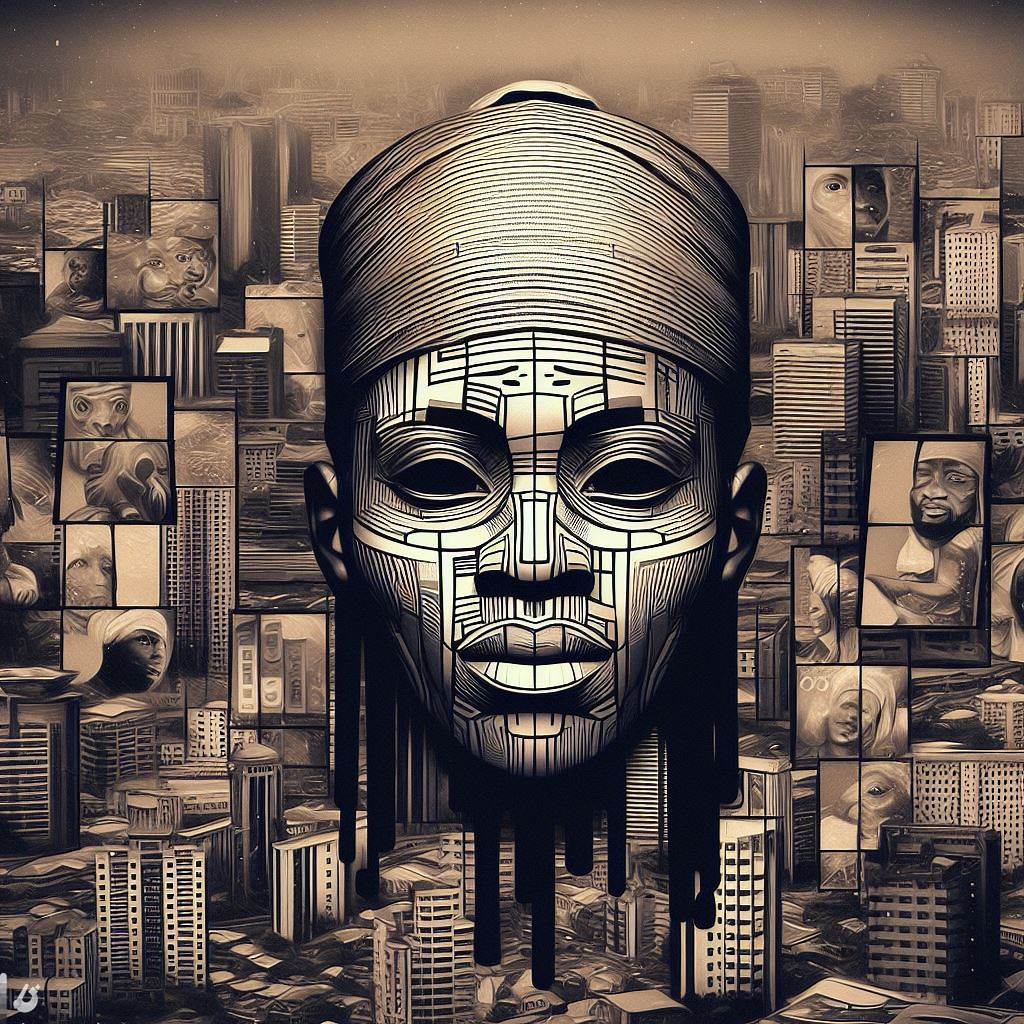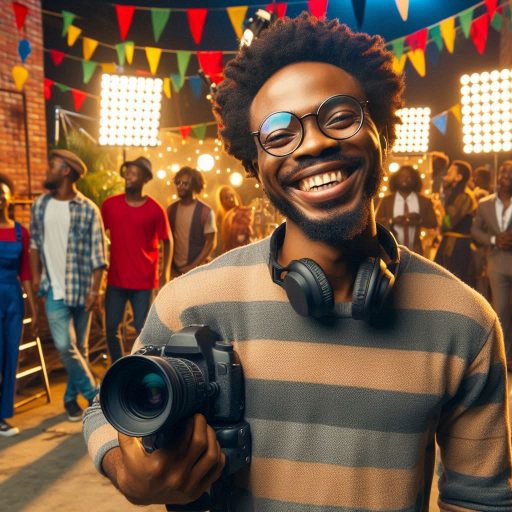Introduction
Nigeria’s entertainment industry is a burgeoning powerhouse, captivating audiences globally. Its journey from local stages to international screens is remarkable. Anchored by Nollywood, Africa’s largest movie industry, and vibrant music scenes, it’s a cultural force.
Growth statistics are staggering. Nollywood alone produces about 2,500 films annually, second only to Bollywood. Nigerian music artists, like Burna Boy and Wizkid, are breaking international records, blending Afrobeat with global rhythms.
This industry isn’t just about fame; it’s economically lucrative. It contributes significantly to Nigeria’s GDP, with the potential for more. Creative professionals find a haven here. Actors, directors, musicians, and fashion designers thrive, leveraging rich cultural narratives.
Opportunities for creative talents are diverse and expanding. From film to fashion, music to digital content creation, each sector offers unique avenues for expression and success. This industry is more than entertainment; it’s a goldmine for creative professionals.
In this exploration, we dive into the myriad opportunities within Nigeria’s entertainment industry. We uncover how creative talent can tap into this vibrant sector. It’s a journey through a world of innovation, culture, and boundless creativity.
The Landscape of Nigeria’s Entertainment Industry
Nigeria’s entertainment sector has evolved dramatically over the years. Initially rooted in traditional music and theater, it has grown into a multimedia powerhouse.
Historically, Nigerian entertainment centered around community storytelling and folk music. In the 1960s, the film industry began, laying the foundation for Nollywood. Music, influenced by Afrobeat pioneer Fela Kuti, also gained momentum.
Today, Nollywood is the heartbeat of this landscape. Producing over 2,500 films yearly, it’s a global phenomenon. The music industry, too, has soared. Nigerian artists are now international stars, blending Afrobeat with contemporary genres.
Key industry statistics highlight this growth:
- Nollywood’s contribution to GDP: Approximately 2.3%.
- Annual revenue: Estimated at $600 million.
- Global music streaming: Nigerian artists regularly top charts in Europe and America.
Major sectors of this industry are:
- Nollywood: Africa’s largest film industry.
- Music: A global Afrobeat movement.
- Fashion: Showcasing vibrant African designs.
- Digital Content: Booming with YouTubers, bloggers, and influencers.
Each sector is not just an entertainment avenue but a career path. They reflect Nigeria’s cultural diversity and creative potential. This industry, once modest, is now a global entertainment hub, providing endless opportunities for creative professionals.
Read: Nigerian Film Hair Stylists: Pioneers in African Cinema
Opportunities in Nollywood
Nigeria’s film industry, Nollywood, is a global phenomenon. It’s the world’s second-largest film producer by volume. This industry is not just about storytelling; it’s a major employment generator.
Nollywood: An Overview
- Production Volume: Over 2,500 films per year.
- Global Reach: Films distributed in Africa, Europe, and North America.
- Revenue: Generates approximately $600 million annually.
Nollywood offers a plethora of career opportunities. Each role is vital, contributing to the industry’s success.
Career Paths in Nollywood
- Acting: The most visible role, actors bring scripts to life.
- Directing: Directors oversee the artistic vision of a film.
- Production: Producers manage the business side, ensuring films are completed efficiently.
- Scriptwriting: Writers create the narratives and dialogues.
- Cinematography: Cinematographers craft the visual style of a film.
Nollywood’s growth has paved the way for success stories. These individuals are not just celebrities; they’re icons of a thriving industry.
Success Stories in Nollywood
- Genevieve Nnaji: Actress and filmmaker. Her directorial debut, “Lionheart,” was Netflix’s first original film from Nigeria.
- Kunle Afolayan: Director and producer known for critically acclaimed films like “October 1” and “The Figurine”.
- Funke Akindele: Renowned actress and producer, famous for her role in “Jenifa’s Diary”.
- Tunde Kelani: A veteran filmmaker, celebrated for his dedication to Yoruba culture in films.
- Kemi Adetiba: Director of the popular film “King of Boys”, she’s a trailblazer for female directors in Nollywood.
These professionals have not just achieved fame; they’ve shaped Nollywood’s identity. They demonstrate the industry’s capacity for creativity and international appeal.
In essence, Nollywood is a vibrant sector offering diverse opportunities. From acting to production, each role is a potential career path. The success stories of Nollywood professionals inspire new talents.
They prove that with passion and perseverance, anyone can make a mark in Nigeria’s film industry. This is not just an entertainment industry; it’s a realm of limitless possibilities for creative professionals.
Read: The Cultural Significance of Film Music in Nigeria
The Booming Nigerian Music Scene
Nigeria’s music scene, particularly Afrobeat, is resounding globally. Its rhythm and energy transcend borders, captivating audiences worldwide.
The Rise of Afrobeat
- Origins: Fela Kuti, the pioneer, blended jazz, funk, and traditional African rhythms in the 1970s.
- Global Reach: Today, Afrobeat artists feature in international charts, collaborate with global stars, and sell out concerts worldwide.
- Influence: Afrobeat influences genres globally, from American hip-hop to British grime.
This surge has created a wealth of career opportunities:
Career Opportunities in the Nigerian Music Scene
- Music Production: Producers are the architects of sound, essential in crafting hits.
- Songwriting: Songwriters pen lyrics and melodies, a talent behind many chart-toppers.
- Performance: Performers, or artists, are the face of the music, bringing songs to life.
- Management: Managers guide artists’ careers, handling business aspects of music.
Success Stories from the Nigerian Music Scene
- Wizkid: A global icon, known for hits like “Essence”. Collaborated with international artists like Drake.
- Burna Boy: Grammy-winning artist, recognized for his unique Afro-fusion style.
- Tiwa Savage: Pioneering female artist, known for powerful vocals and captivating performances.
- Davido: Renowned for his energetic performances and philanthropy in the music industry.
- Don Jazzy: Legendary producer and mogul, founder of Mavin Records, shaping the careers of many artists.
These success stories underscore the potential within Nigeria’s music industry. They represent a blend of talent, hard work, and creativity.
The Nigerian music scene is more than entertainment; it’s a booming business sector. It offers creative professionals various avenues to explore and excel. From the studio to the stage, each role plays a part in the industry’s success.
Nigeria’s music scene is a vibrant ecosystem. It offers endless possibilities for those with a passion for music. The global success of Nigerian artists and producers is a testament to the industry’s potential.
This scene is not just creating music; it’s shaping global culture and offering lucrative careers. For aspiring music professionals, the Nigerian music industry is indeed a goldmine of opportunities.
Read: Collaborating as a Composer in Nigerian Cinema
Fashion and Design: A Creative Showcase
Nigeria’s fashion industry is a vibrant testament to its cultural richness and creative talent. It’s gaining global recognition, showcasing unique styles that blend traditional aesthetics with contemporary designs.
Nigeria’s Fashion Industry: An Overview
- Growth: Rapidly emerging as a fashion hub in Africa.
- Global Reach: Nigerian designers are featured in international fashion shows and magazines.
- Style: Known for bold colors, intricate patterns, and blending traditional and modern styles.
The fashion industry offers a spectrum of career opportunities:
Career Opportunities in Fashion
- Design: Fashion designers create clothing and accessories, setting trends.
- Styling: Stylists curate outfits for events, photoshoots, and clients.
- Modeling: Models showcase designs on runways and in photoshoots.
- Fashion Photography: Photographers capture the essence of designs, vital for marketing.
Successful Nigerian Fashion Designers and Brands
- Deola Sagoe: Renowned for her innovative designs and use of traditional African fabrics.
- Lisa Folawiyo: Famous for modernizing traditional Ankara fabric, gaining international acclaim.
- Mai Atafo: Known for his bespoke menswear and bridal lines.
- Folake Folarin-Coker (Tiffany Amber): Pioneer in the Nigerian fashion industry, known for luxurious designs.
- Orange Culture by Adebayo Oke-Lawal: A brand that challenges gender norms in fashion.
These designers and brands are not just successful; they’re trailblazers. They’ve put Nigerian fashion on the global map, showcasing the country’s rich culture and creativity.
The Nigerian fashion industry is more than a showcase of beauty and style; it’s a flourishing business sector. It offers a wealth of opportunities for creative professionals. From the drawing board to the runway, each role contributes to the industry’s vibrant tapestry.
Nigeria’s fashion scene is a dynamic and inspiring sector. It offers creative professionals a platform to express their artistry and make a global impact. The success stories of Nigerian fashion designers and brands are beacons of inspiration.
They show that with creativity, passion, and hard work, the fashion world is an oyster waiting to be explored. For those with a flair for fashion, Nigeria’s fashion industry is indeed a goldmine of opportunities.
Read: How to Become a Successful Film Composer in Nigeria

Digital Content Creation and Online Media
The digital realm in Nigeria is a new frontier for creative expression. Here, content creators are redefining entertainment.
The Rise of Digital Content Creators
- Growth: With increased internet access, digital content creation is booming in Nigeria.
- Platforms: YouTube, Instagram, and TikTok are popular outlets for Nigerian creators.
- Impact: Digital creators are gaining huge followings, both locally and internationally.
The digital space offers diverse opportunities:
Opportunities in Digital Content Creation
- Blogging: Writers share insights on various topics, from fashion to technology.
- Vlogging: Video bloggers create engaging content, often gaining massive YouTube followings.
- Podcasting: Podcasters dive deep into discussions, attracting dedicated listeners.
- Social Media Influencing: Influencers leverage platforms like Instagram for brand partnerships.
Technology’s Role in Entertainment and Creativity
- Access: Smartphones and affordable data plans have democratized content creation.
- Tools: Editing software and apps enable high-quality content production.
- Reach: Social media algorithms help creators reach global audiences.
Digital content creation in Nigeria is more than just a trend; it’s a burgeoning industry. It provides a platform for voices that might otherwise go unheard. From bloggers to influencers, each creator contributes to Nigeria’s rich tapestry of digital media.
Nigeria’s digital content scene is a realm of endless possibilities. It offers creative professionals new ways to connect, entertain, and inspire. The success of Nigerian digital content creators is a testament to the industry’s potential.
This digital revolution is not just changing the way we consume entertainment; it’s shaping the future of creativity. For aspiring content creators, the digital world offers a canvas for innovation and expression.
Challenges and Overcoming Them
Nigeria’s entertainment industry, while promising, faces significant challenges. Understanding and addressing these is key to sustaining growth and success.
Challenges in Nigeria’s Entertainment Industry
- Funding: Access to capital is limited for new and established artists alike.
- Piracy: Rampant piracy significantly reduces revenue for creatives.
- Market Saturation: Overcrowding in certain sectors makes standing out difficult.
- Infrastructure: Inadequate infrastructure hinders production quality and distribution.
- Professional Training: There’s a gap in formal education and training for entertainment careers.
Despite these hurdles, there are effective strategies for overcoming them:
Strategies for Overcoming Challenges
- Collaborations and Partnerships: Working together can pool resources and knowledge.
- Leveraging Digital Platforms: Digital distribution reduces the impact of piracy and reaches wider audiences.
- Diversification: Exploring less saturated niches within the industry.
- Investing in Quality: Focusing on high-quality production can set content apart.
- Continuous Learning: Embracing workshops, online courses, and mentorship.
The role of the government and private sector is crucial in supporting the industry:
Role of Government and Private Sector
- Policy Making: Implementing policies that protect intellectual property and encourage investment.
- Funding and Grants: Providing financial support for promising projects.
- Infrastructure Development: Investing in technology and facilities that aid production.
- Training and Development: Supporting educational programs tailored to the industry’s needs.
The Nigerian entertainment industry has the potential to overcome its challenges. With strategic planning and support, it can continue to thrive and contribute significantly to the economy.
For creative professionals, these challenges are hurdles, not roadblocks. With creativity, resilience, and the right support, they can navigate these challenges and succeed in this dynamic industry.
Preparing for a Career in Entertainment
Embarking on a career in Nigeria’s entertainment industry requires more than just talent; it demands training and skill development.
Importance of Training and Skill Development
- Competitiveness: Proper training can set you apart in a competitive industry.
- Skill Enhancement: It equips you with the necessary tools to excel creatively and technically.
- Adaptability: Continuous learning helps you adapt to changing industry trends.
There are numerous resources and institutions dedicated to this:
Resources and Institutions for Education and Training
- Nollywood Workshops: Offers training in acting, directing, and film production.
- PEFTI Film Institute: Provides comprehensive training in film, music, and performing arts.
- Muson School of Music: Ideal for those aspiring to enter the music industry.
- African Fashion and Design Week: Offers workshops for upcoming fashion designers.
- Online Platforms: Websites like Udemy and Coursera offer courses in digital content creation.
For aspiring entertainment professionals, breaking into the industry requires strategy:
Tips for Breaking Into the Entertainment Industry
- Network: Connect with professionals and attend industry events.
- Showcase Your Work: Use social media and digital platforms to display your talent.
- Internships and Apprenticeships: Gain practical experience and industry insights.
- Stay Informed: Keep up with the latest trends and advancements in your field.
- Persistence and Resilience: The path may be challenging, but determination is key.
The entertainment industry in Nigeria is vibrant and full of potential. However, to truly excel, one must be well-prepared and continuously develop their skills.
With the right training, mindset, and approach, the opportunities in this industry are limitless. Whether you dream of the silver screen, a music career, fashion runways, or digital fame, preparation is your first step to success.
Conclusion
Nigeria’s entertainment industry, brimming with potential, stands as a beacon for creative talents.
It’s a diverse landscape, offering opportunities across film, music, fashion, and digital media. This sector is not just an entertainment hub; it’s a flourishing ground for innovation and creativity.
To aspiring creatives, this industry offers more than fame. It’s a chance to showcase talent, tell compelling stories, and impact culture.
Nollywood’s global reach, the international acclaim of Nigerian music, the rise of fashion on world stages, and the surge in digital content creation illustrate the vast opportunities available.
The future of Nigeria’s entertainment industry is bright and promising. It’s poised for further growth and global influence. This is a call to action for Nigeria’s creative minds.
Dive into this dynamic sector, harness its opportunities, and contribute to its vibrant future. Your talent and vision can shape the next chapter of Nigeria’s entertainment story.




